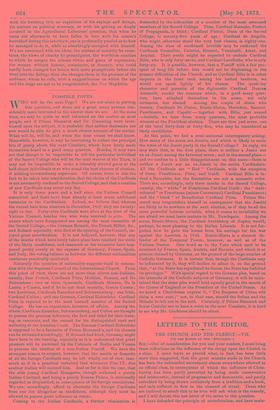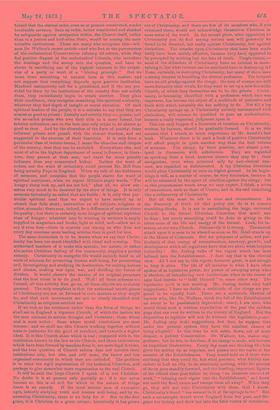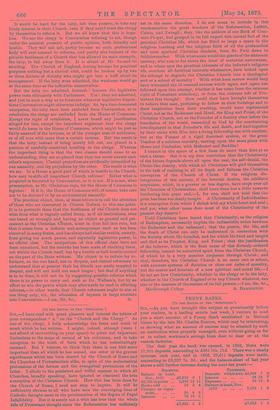LETTERS TO THE EDITOR.
THE CHURCH AND THE CLERGY.—VII.
[TO THB EDITOR OF THE "SPEOTATOR:]
SIE, —Out of consideration for you and your readers, I must bring these reflections on the influence of the clergy upon the Church to a close. I must leave as proved what, in fact, has been little more than suggested, that the great mistake made in the Church has been the unbounded ascendancy almost everywhere allowed to an official class, in consequence of which the influence of Chris- tianity has been partly perverted by being made conservative and aristocratic, instead of progressive and democratic, and partly enfeebled by being drawn exclusively from a tradition and a book, and only suffered to flow in the channel of ritual. Those who are inclined to admit this to be true will ask what is the remedy, and I will devote this last letter of the series to this question.
I have defended the principle of sacerdotalism, and have main-
'tamed that the clerical order, even as at present constituted, render invaluable services. Such an order, better constituted and checked by safeguards against usurpation within the Church itself, rather than in a jealous and half-alien State, would be among the most valuable institutions. There are many who recognise this—wit- ness Dr. Wallace's recent article—and who fret at the perverseness of the ecclesiastical Conservatives refusing all reform, while they feel positive disgust at the ecclesiastical Liberals, who introduce the hustings and the stump into the question, and have no -shame in sacrificing one of the highest interests to the exigen- cies of a party in want of a "blazing principle." But we must trust something to natural laws in this matter, and not suppose that everything depends upon positive institution. Mankind instinctively call for a priesthood, and if the one pro- vided for them by the institutions of the country does not satisfy them, they immediately begin to create another. They place their confidence, they recognise something like spiritual authority, wherever they find depth of insight or moral elevation. Of such -spiritual leaders of the people, it is a mistake to say that they are almost as good as priests ; literally and strictly they are priests, and the so-called priests who owe their title to a more formal, but inferior ordination, oau in the best case only attain to be almost as good as they. And by the alteration of the form of society, these informal priests now preach with the utmost freedom, and are supported in the exercise of their functions. It is only from a particular class of lecture-rooms, I mean the churches and chapels of the country, that they can be excluded. Everywhere else, and most of all in the highest department of moral influence, in litera- ture, they preach at their ease, and exert far more priestly influence than any consecrated bishop. Neither the want of -orders, nor the want of orthodoxy, could prevent Mr. Mill from being actually Pope in England. When we talk of the feebleness of sermons, and complain that the people starve for want of -spiritual nutriment, when we repeat Milton's angry words, "The hungry sheep look up, and are not fed," after all, we allow our- selves very much to be deceived by the show of things. It is only sermons technically so called that are feeble ; it is only that par- ticular spiritual meal that we expect to have served up at church that falls short ; instruction on all subjects, religious or -other, abounds ; there may, indeed, be a difference of opinion about its quality ; but there is certainly more danger of spiritual repletion than of hunger ; whatever may be wanting in sermons is amply supplied in magazines and books, light or solid, and—allow me to -say it even here—there is scarcely one among us who does not every day consume more leading articles than is good for him.
The same distinction is to be drawn when we say that Christ- ianity has been too much identified with ritual and worship. The authorised teachers of it make this mistake, but nature, or rather the active Christian feeling of the community, supplies a partial remedy. Christianity in energetic life would embody itself in all sorts of schemes for promoting human well-being, for persecuting evil, investigating and studying its destruction, for uniting nations -and classes, making war upon war, and dividing the forces of division. It would observe the maxim of its original preachers that the best ritual is to do good. Well ! all these schemes are formed, all this activity does go on, all these objects are zealously pursued. The only complaint is that the authorised mouth-pieces of Christianity are not so forward in such matters as they might be, and that such movements are not so closely identified with Christianity as religious services are.
If we look at the substance rather than the form of things, we shall see in England a vigorous Church, of which the leaders are the men eminent in serious thought and literature ; those whose zeal is most active ; those whose moral convictions are most intense ; and we shall see this Church working together without tests or jealousies for the god l of mankind, and towards a higher ideal. It is this Church alone which is real ; compared with it, the institution known to the law as the Church, and those institutions which have been formed by seceders from it, are mere legal fictions, and the true question of Church reform does not concern these institutions only, but also, and still more, the vaster and less .organised community in which they are included. The problem is to relax the rigid organisation of the technical Churches, and perhaps to give somewhat more organisation to the real Church.
It will be said the large Church I speak of is not Christian. No doubt it is at present only partially so ; if it can never become so, this is an evil for which in the nature of things there is no remedy. If the most serious men of successive ages, intently studying truth and human well-being, end by re- nouncing Christianity, there is no help for it. But in the first place, it is Christian to a great extent ; historically it has grown out of Christianity, and there are few of its members who, if you examined them, would not acknowledge themselves Christian in some sense of the word. In the second place, what opposition to Christianity you do find among serious men will generally be found to be directed, not really against Christianity, but against clericalism. The attacks upon Christianity that have been made lately have been mainly effective, because they have appeared to be prompted by nothing but the love of truth. People reason,— most of the defenders of Christianity have an interest in main- taining it, but what interest can its assailants have in destroying it? None, certainly, in destroying Christianity, but many of them have a strong interest in humbling the clerical profession. The lawyers have an old grudge against the clergy ; the men of science are still more distinctly their rivals, for they want to set up a new Scientific Church, of which they themselves are to be the priests. Christ- ianity, in becoming identified with a profession which once was imperious, has become the object of a multitude of jealousies and feuds with which naturally she has nothing to do. Not till a lay Christianity springs up, a Christianity entirely unconnected with clericalism, will science be qualified to pass an authoritative, because a really impartial, judgment upon it.
This can only happen if a literature of treatises on Christianity, written by laymen, should be gradually formed. It is on this account that I attach so much importance to Mr. Arnold's last book. Whatever there is in such a book of positive Christianity will affect people in quite another way than the best volume of sermons. The clergy, by their position, are almost para- lysed in discussion with unbelievers. They are regarded as speaking from a brief, however sincere they may be ; their antagonists, even when actuated only by anti-clerical ran- cour, are regarded as disinterested. A lay Christian literature would place Christianity at once on higher ground. In its begin- nings it will, as a matter of course, be very heterodox, because it will be animated by the spirit of rebellion against the clergy ; but as this prepossession wears away we may expect, I think, a series of concessions, such as those of Comte, and in the end something like a rediscovery of Christianity.
But all this must be left to time and circumstances. In the discovery of truth all that policy can do is to remove stumbling-blocks. It is not in assimilating the large, universal Church to the formal Christian Churches, that much can be done ; but surely something could be done in giving to the latter some of the life and energy of the former. Look, for in- stance, at our own Church. Defensively it is strong. The annual attack upon it is seen to be absurd as soon as Mr. Miall stands up in the House of Commons. But for purposes of action, and par- ticularly of that energy of reconstruction, recovery, growth, and development which all organisms have that are alive, what helpless imbecility ! Mr. Josling talks of the vigour which has been infused into the Establishment. I dare say that is the clerical view. All I can say is, this vigour, however great, is not enough to keep it alive. The life of all societies is what I have often spoken of as legislative power, the power of sweeping away what is obsolete, of introducing new institutions when in the course of ages God decrees to "fulfil Himself " in some other way. The legislative spirit is not wanting. Mr. Josling makes very bold suggestions ; I have no doubt a multitude of the clergy are pre- pared to be equally bold. There are a multitude likewise of laymen who, like Dr. Wallace, think the fall of the Establishment an event to be passionately deprecated ; many, I am sure, who would think such a wanton repudiation of the past the saddest page that can ever be written in the history of England. But the disposition to legislate will not do without the legislative power. Mr. Josling may make suggestions, but does he suppose that under the present system they have the smallest chance of being adopted ? In due time he will settle down, out of mere despair, a patient Conservative. Dr. Wallace, too, makes sug- gestions; but he too, in due time, if no change is made, will become an impatient Destructive. Every day some one thinking like him gives the matter up as hopeless, and passes into the ranks of the enemies of the Establishment. They would hold on if there were anything that they could do, but what patience, what fidelity can endure to look on idly, to do absolutely nothing, while the process of decay goes steadily forward, and the bustling, important figures of the official class pass before us, doing "an immense amount of work," "infusing such vigour into the Establishment," and know not until the flood comes and sweeps them all away? When they go, they will not take Christianity with them, that I know. Christianity's blood " has earnest in it of far springs to be." But such a catastrophe would sever England from her past, and dis- grace her history and draw her into the fatal vortex of revolution. It would be hard for the laity, left thus passive, to take any lively interest in their Church, even if they could trust the clergy by themselves to reform it. But we all know that this is hope- less. We see the clergy in Convocation refusing to act, though under the greatest pressure of public opinion, both friendly and hostile. They will not act, partly because no such professional body will ever consent to reforms, and partly also because of the pitiable feebleness of a Church that has allowed its main strength, the laity, to fall away from it. It is afraid of Mr. So-and-So seceding. The Church of England, having become for practical purposes nothing but a clerical club, could be broken up by two or three doctors of divinity who might get into a huff about its management. If the laity were admitted, the weakness would go at the same time as the inflexible conservatism.
But the laity are admitted, forsooth ! because the legislative power rests ultimately with Parliament. Yes ! they are admitted,
and just in such a way as to frustrate whatever legislative disposi- tions Convocation might otherwise indulge. As, by a time-honoured usurpation, the laity have been excluded from Convocation, so in retaliation the clergy are excluded from the House of Commons.
Except the right of retaliation, I never heard any justification alleged for this, except the impudent argument that the clergy would do harm in the House of Commons, which might be just as fairly asserted of the lawyers, or of the younger sons of noblemen, or of all men with more than a certain income. But the result is that the laity, instead of being merely left out, are placed in a position of carefully-contrived hostility to the clergy. Whereas the important thing is that the two classes should come to an understanding, they are so placed that they can never answer each other's arguments. Clerical prejudices are artificially intensified by one assembly, and lay prejudices by the other. The result is what we see. In a House a good part of which is hostile to the Church, how easy to stifle all important Church reforms ! Either what is proposed is favoured by Convocation, or it is not. If it is not, what presumption, as Mr. Gladstone says, for the House of Commons to legislate ! If it is, the House of Commons will, of course, take care not to be dictated to by an ecclesiastical assembly.
The practical object, then, of these letters is to call the attention orthose who are interested in Church Reform to this one point.
It is to persuade them that the feebleness of the Church does not arise from what is vaguely called decay, as if all institutions, even one based so strongly and having an object so general and per- manent as the Christian Church, must in time fall into ruin, but that it arises from a definite mal-arrangement such as has been observed in many States, and has always had similar results, namely, from giving too much power, and especially legislative power, to an official clam. The usurpations of this official class have not been unnoticed, but the mistake has been made of checking them, not within the Church itself, but by a hostile or half-hostile control on the part of the State without. My object is to induce lay re- formers, on the one hand, not to despair, and clerical reformers to understand that at present their lay friends are sorely tempted to despair, and will not hold out much longer ; but that if anything is to be done, it will not be by suggesting possible reforms which
there is no power to carry out, such as Dr. Wallace's, but by an effort to win the power which may afterwards be used in effecting reforms,—in other words, that Church reformers ought to aim at one thing only, viz., the admission of laymen in large numbers
into Convocation.—I am, Sir, &c., A.




































 Previous page
Previous page